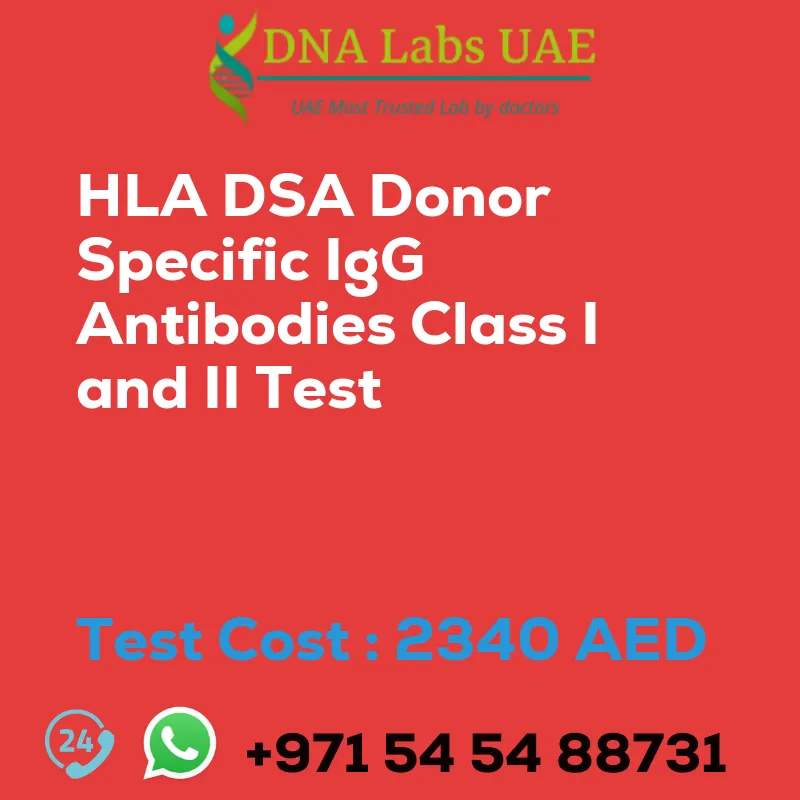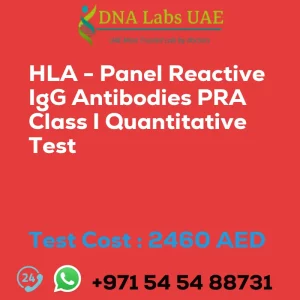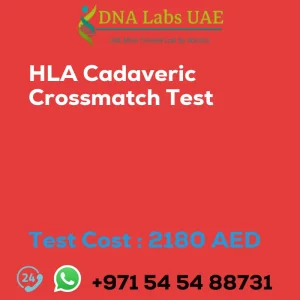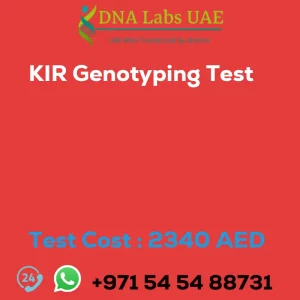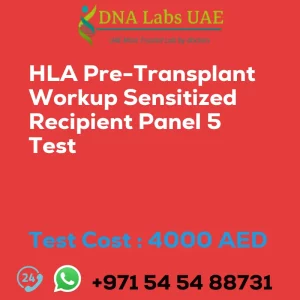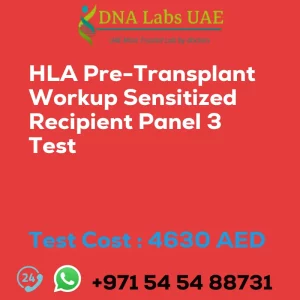HLA DSA DONOR SPECIFIC IgG ANTIBODIES CLASS I and II Test
At DNA Labs UAE, we offer the HLA DSA DONOR SPECIFIC IgG ANTIBODIES CLASS I and II Test at a cost of AED 2340.0.
Test Components and Price
Test Name: HLA DSA DONOR SPECIFIC IgG ANTIBODIES CLASS I and II Test
Price: 2340.0 AED
Sample Condition
RECIPIENT: 3 mL (2 mL min.) serum from 1 SST. Collect specimen preferably 48 hours after dialysis.
DONOR: 12 mL (10 mL min.) whole blood in 2 Yellow Top (ACD) tubes. Ship refrigerated. DO NOT FREEZE.
Doctor’s prescription on the letter head with stamp AND 1 photograph each of recipient and donor is mandatory.
Above specimen requirements are for a single donor being cross matched with a single recipient @ Rs.10,000. Separate registrations required @ Rs. 10,000 for every additional Donor & Recipient pair.
Report Delivery
10-12 days
Method
Luminex X-Map technology
Test Type
Transplantation
Doctor
Nephrologist
Test Department
Pre Test Information: Collect specimen preferably 48 hours after dialysis. Doctor’s prescription on the letter head with stamp AND 1 photograph each of recipient and donor is mandatory.
Test Details
HLA DSA (Donor Specific IgG Antibodies) Class I & II Test is a laboratory test that detects the presence of donor-specific IgG antibodies against human leukocyte antigen (HLA) molecules in the recipient’s blood.
HLA molecules are proteins found on the surface of cells that play a crucial role in the immune system’s recognition of self and non-self cells. When a person receives an organ transplant, their immune system may recognize the HLA molecules on the transplanted organ as foreign and mount an immune response against it. This immune response is primarily mediated by the production of donor-specific IgG antibodies.
The HLA DSA Class I & II Test helps assess the compatibility between the donor and recipient by identifying the presence of IgG antibodies that specifically target the HLA molecules of the donor. Class I HLA molecules are found on almost all nucleated cells, while Class II HLA molecules are primarily found on immune cells.
The test involves taking a blood sample from the recipient and testing it against a panel of HLA antigens from the donor. The recipient’s serum is mixed with the HLA antigens, and if specific IgG antibodies are present, they will bind to the HLA antigens, forming immune complexes. These immune complexes can then be detected using various techniques, such as flow cytometry or solid-phase assays.
The HLA DSA Class I & II Test is crucial in organ transplantation, as the presence of donor-specific IgG antibodies can increase the risk of antibody-mediated rejection, graft failure, and other complications. The test results help guide clinicians in selecting the most suitable donor for transplantation and in monitoring the recipient’s immune response post-transplantation.
| Test Name | HLA DSA DONOR SPECIFIC IgG ANTIBODIES CLASS I and II Test |
|---|---|
| Components | |
| Price | 2340.0 AED |
| Sample Condition | RECIPIENT: 3 mL (2 mL min.) serum from 1 SST. Collect specimen preferably 48 hours after dialysis.\nDONOR: 12 mL (10 mL min.) whole blood in 2 Yellow Top (ACD) tubes. Ship refrigerated. DO NOT FREEZE. \nDoctor’s prescription on the letter head with stamp AND 1 photograph each of recipient and donor is mandatory. Above specimen requirements are for a single donor being cross matched with a single recipient @ Rs.10,000. Separate registrations required @ Rs. 10,000\ for every additional Donor &Recipient pair. |
| Report Delivery | 10-12 days |
| Method | Luminex X-Map technology |
| Test type | Transplantation |
| Doctor | Nephrologist |
| Test Department: | |
| Pre Test Information | Collect specimen preferably 48 hours after dialysis. Doctor’s prescription on the letter head with stamp AND 1 photograph each of recipient and donor is mandatory. |
| Test Details |
HLA DSA (Donor Specific IgG Antibodies) Class I & II Test is a laboratory test that detects the presence of donor-specific IgG antibodies against human leukocyte antigen (HLA) molecules in the recipient’s blood. HLA molecules are proteins found on the surface of cells that play a crucial role in the immune system’s recognition of self and non-self cells. When a person receives an organ transplant, their immune system may recognize the HLA molecules on the transplanted organ as foreign and mount an immune response against it. This immune response is primarily mediated by the production of donor-specific IgG antibodies. The HLA DSA Class I & II Test helps assess the compatibility between the donor and recipient by identifying the presence of IgG antibodies that specifically target the HLA molecules of the donor. Class I HLA molecules are found on almost all nucleated cells, while Class II HLA molecules are primarily found on immune cells. The test involves taking a blood sample from the recipient and testing it against a panel of HLA antigens from the donor. The recipient’s serum is mixed with the HLA antigens, and if specific IgG antibodies are present, they will bind to the HLA antigens, forming immune complexes. These immune complexes can then be detected using various techniques, such as flow cytometry or solid-phase assays. The HLA DSA Class I & II Test is crucial in organ transplantation, as the presence of donor-specific IgG antibodies can increase the risk of antibody-mediated rejection, graft failure, and other complications. The test results help guide clinicians in selecting the most suitable donor for transplantation and in monitoring the recipient’s immune response post-transplantation. |

